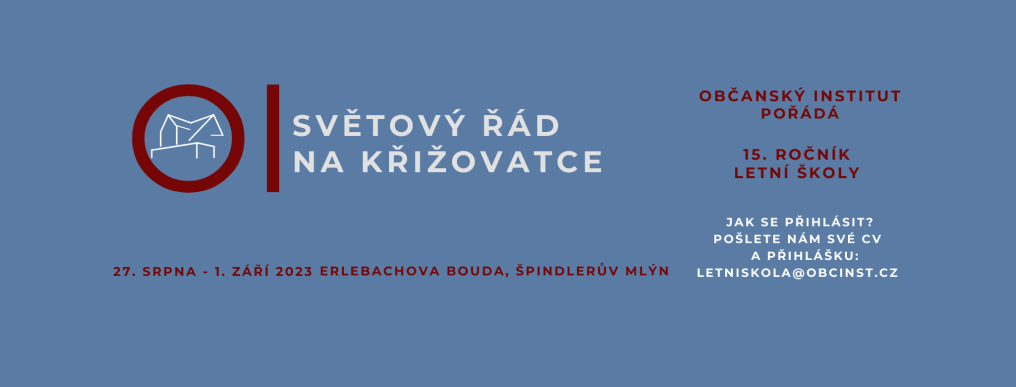Vystoupení ředitele Občanského institutu Romana Jocha na konferenci v portugalském Estorilu 28. Text je v anglickém jazyce.
First of all, I would like to thank the organizers for inviting me to this Conference; this is my first time ever being in Portugal. I am sure there are many similarities between the Czechlands and Portugal, but just now I am able to think about one of them, only: both the Czechlands and Portugal shared the same ruling dynasty in one period of our history – the Habsburg dynasty -, which ruled in Portugal in 1580-1640 and governed the Czechlands in 1526-1918. Mentioning the Habsburgs, they remind us of the issue of the Empire as opposed to the Nation-State.
The dichotomy of “the Empire versus the Nation-State” concerns the form, the framework of a political society. However, my claim is that the content of a political society is more important than its form. By the content of a political society, I understand its answer to the question: How a political society – its regime – guarantees, protects and defends justice, freedom, and natural rights of its citizens?
Some people claim that the Nation-State, as a form, is barbaric, indeed tribal. Others argue that the Nation–State is the only framework (a necessary, but not a sufficient condition) of freedom and democracy.
The reputation of an Empire is even worse, at least in some circles; they claim that an Empire – any Empire – is necessarily bloodthirsty, because it inevitably leads to wars abroad and repression, loss of freedom, at home.
I politely disagree with all those strong statements and extreme positions. I would maintain that there are both advantages and disadvantages, virtues and vices, of both an Empire and a Nation-State as forms of political societies; and that those advantages and disadvantages, virtues and vices, are contingent upon circumstances, cultures, and traditions of respective societies. The primary issues that we have to ask ourselves in order to judge and evaluate justice of this particular Empire or that particular Nation-State are issues of their regimes – how are they able to provide for freedom and natural right, and solicite, gain and secure loyalty (not necessarily explicit consent) of the governed.
There had been at least three Empires, which have been beneficient to human dignity – at least in comparison to their alternatives.
The first was the Roman Empire. Even though it fed Christians to lions at some time in its history; it, however, established Greek wisdom, rule of law, internal peace and stability in the whole Mediterranean region, the then known civilised World. Virtues of citizinship and patriotism were cultivated there. Even though it committed many bloody deeds, it was moraly and civilizationaly superior to barbaric tribes of those times, which were less noble and more bloodthirsty.
The second was the Habsburg, Catholic Empire. It committed many crimes, as well, but according to all standards it was, by far, less bloodthirsty than, e.g. the Aztec imperialism in Central America, which practiced genocides of other Indian tribes and human sacrifices on monstrous scale. So, the defeat of the Aztec Empire by the Habsburg Empire was a net contribution to human rights.
But let me, please, shift the focus of our attention from Central America to Central Europe. In its last 60 years – in the years since 1859 – the Habsburg Empire in Central Europe was a benevolent, benign, semi-authoritarian, semi-democratic rule of Emperor Franz Josef I. It was not perfect, but the existing alternatives – its neighbors – were much worse: a militaristic Prussia, a tsarist serfdom of Russia, and a feudal Ottoman Empire with all its cruelties.
Habsburgs in their last years represented an idea and a praxis of a supra-national rule of law. Their enemies were ethnic nationalists of all different colours and tribes. The region of Central Europe has been ethnicaly and nationaly mixed since times immemorial, therefore emergence of Nation-States in Central Europe led to perpetual hatreds, hostilities and wars among nations (with few exceptions).
That was the choice at the end of the World War I in 1918 -20: what form of politcal society (societies) in such multiethnic, multinational region between a huge Germany in the West and a huge Russia in the East would be most conducive to peace, justice, freedom and happiness of its (their) inhabitants? Prudence had dictated one of two options: either a supra-national (Con)-Federation (that was the Habsburgs option, which had become unlikely at the end of the World War I – for political reasons, only); or a rock-solid alliance and friendship among all nations in the Central Europe (that had proved to be impossible because of ethnic hatreds). It was easy to predict what would happen, had neither of both options materialised, and what did inded happen: the peoples and nations and countries of Central Europe, lacking the unity, would become – and were – overrun and conquered either by Germans, or by Russians, or by both. In fact, they were overrun and conquered by both indeed, consequently, first by Nazi Germans, then by Communist Russians.
Let us address the third of empires, the British Empire of the 19th Century. It was defined by classical liberalism, free trade, evangelic protestant religion; it stood against slavery, piracy, and for freedom of High Sees. The net contribution of the British Empire to the cause of freedom and individual rights has been definitely positive. The countries and nations, who were parts of the 19th Century British Empire, are now better off because of that fact: Let us compare India to China, Kenya to Ethiopia. Those, which were British colonies, are, from the freedom’s point of view, better off than those, which were not. Hence, it is perhaps not stretched too far to describe the British Empire as a “Force of, by and for the Freedom.”
What about the United States of America? Is it a Republic – a Nation-State – or an Empire? The U.S. definitely is a Nation-State, even a Nation-State pars excellence, like not many other in the World. But is the U.S. an Empire, as well?
It depends on our definition of Empire. If Empire necessarily means coercion, rule of other peoples against their will and without their consent, then the answer is definitely “No!” If an Empire, however, means a loose, voluntary alliance of like-minded regimes, with a leading role of one of them, then the answer would emphatically be “Yes!” But in that case the American Empire is nothing new, nothing brought to life by G.W. Bush or the “neo-cons”just recently, but the American Empire really started in 1941 (exactly 65 years ago). The American Empire, if we are to call it in that way, is rather something similar to the “Empire of Freedom”, which had been Thomas Jefferson’s description of the original 13 U.S.A. The American Empire in that sense has ment the Atlantic allies since 1941, has ment NATO since 1949, has ment the West, or the Free World, during the Cold War times.
The U.S.A is both an Empire (in the latter, not in the former, sense) and a Nation-State. Let us explore Nation-States now.
Positive aspects of Nation-States are (claimed to be) following: Nation-States are conducive to freedom and democracy; because of their scale, which is medium; because there is an easy communication among its citizens (Nation-States usually have one language only); and because Nation-States both gain and induce loyalty of its peoples. (Why Czech and Slovak Federal Republic collapased in 1992? Why Baltic states – Estonia, Latvia and Lithuania, formed no Federation of Baltic states after they had gained their independence from the Soviet Union in 1991? Because there were no loyalties – or at least there were smaller loyalties – to supranational Federations, than there were loyalties to respective Nation-States.)
All true. But we must be aware that the Nation-State as a political form is no guaranteee of either freedom or democracy. The case that the Nation-States is a guarantee of both freedom and democracy, applies exclusively to the Western Civilisation in Europe and North America and to its imitations in Latin America and East Asia; but in the last 20 years, only. Before that, Mexico, Guatemala, Bolivia, South Korea, Taiwan, were Nation-States, but ones without much of either freedom or democracy. Nation-States in Africa, if there are any, are no success, either. (Query: 100 years ago, in 1906, where was more personal freedom, in the Mexican Nation-State of Porfirio Diaz, or in the Habsburg, Austrian Empire of Franz Josef I? The answer is obvious. No, the Mexico is not the correct answer!)
It is perhaps safe to risk a thesis, that the success of Nation-States in regard to liberty is more an issue of and due to Western Civilisation, its political culture, its liberal regimes, than an issue of and due to the very form of the Nation-State!
Let us now explore the alleged negative aspects of Nation-States. Some people claim that Nation-States are necessarily barbaric, tribal, oppressive towards ethnic or religious minorities, etc.; that nationalism is necessarily a force for evil.
Those claims are over-the-board and may easily be proved to be false. For instance, the U.S.A. is a Nation-State pars excellence and an example, perhaps the example, of freedom. American patriotism, even nationalism, kept the flame of freedom alive behind the Iron Curtain, in the Communists’ ruled Central Europe, during the Cold War.
Poland is another example of a Nation-State and nationalism being forces of and for freedom. In the last 230 years, Polish nationalism, together with the Catholic Church in Poland, have always been a force for fredom, justice and civilisation. Polish nationalists have been those who went to torture chambers – not as torturers, but as those tortured.
To conclude the issue of the Nation State vs. the Supra-National Empire: both could be on the side of freedom, both could be against it. It all depends on circumstances.
Let us address the issue of the European Union. The E.U. attempts to be an Empire, but cannot make it, because it is based on no convincing, widely-shared imperial idea. Except, perhaps, on the idea of anti-Americanism: the imperial idea of the E.U., its raison d’etre, is to serve as a counter-balance to America. But this is an idea, which is emphatically shared by neither all, nor most in the E.U. It is shared neither by U.K., nor by the new member-states in Central and Eastern Europe. We – majority of us in Central and Eastern Europe – consider the Trans-Atlantic alliance with America, our political partnership with the U.S., and the political and military presence of the U.S. in Eutrope, which makes the U.S. an European power, as vital to our national interests, long-term security, stability and tranquility in Europe. So, anti-Americanism cannot succeed as a basic, founding idea of the United States of Europe. And if anti-Americanism is pressed too hard by some in Western Europe as a founding idea of the E.U., it will ruin the E.U. internally. The result would be an internal collaps of the E.U. We shall make that happen.
So, anti-Americanism will not do, will not work as the imperial idea of the E.U. And there is no other idea, which could serve as the founding, imperial idea. No idea, no Empire.
Therefore, the E.U. is and will remain for a forseeable future a convenient union – an Union of Convenience, only – to make things and our life, especially in terms of commerce, easier in Europe. However, there is no political, existential loyalty to the E.U. in Europe. The European flag is not the one to die for either in the trenches or at the barricades. Moreover, there is not enough support for the creation of the United States of Europe as a Federal Union in and of Europe. I happen to believe the the United States of Europe would be no danger to the trans-Atlantic relations with America (after the last E.U. enlargement and admission of the new Central-Eastern European states in May 2004, there is no anti-American majority in the E.U, anymore) – had it been created -, but there is simply not enough will to create a Federal European state. It will not be created. At least, not any time soon. Were an European Federal State to be created, it would have had monopoly on the use of the European force, including the nuclear one. But it will not happen; neither the United Kingdom, nor France, would surrender Command of their strategic nuclear forces to any person in Brussels. Can you imagine, the supreme Commander-in-Chief of both British and French nuclear weapons being neither British Prime Minister, nor French President, but a Javier Solana, or a José Barroso? (Well, to suggest that latter, it may perhaps make me popular here in Portugal!)
Nation-State as a prevailing and primary form of political society will remain with us, for better or worse. That is the reality. Our task will be to make it a force rather for the better than for the worse.
Post Scriptum: The most important issues in Europe of upcoming years will be those of Civilisation, primarily of its quality, but of its quantity, too; that is, its demography. Secular society implies falling birth-rates, dying- out and aging of populations, consequent immigration of cheap labor from North Africa and Near East, and euthanasia. As a result, Europe will become more Moslem. On the other hand, should there happen a Judeo-Christian revival in Europe – if it happens and were it happen – that would imply and induce some sort of restoration and/or renaissance of our Civilisation. The cultural trends within society, including political society, are and will be more important than the political frame-work of society. Civilisational content is and will be more important than the form of political society – be that form a Nation-State or a supra-national Empire.
Remarks delivered in Estoril, Portugal, June 28, 2006.








